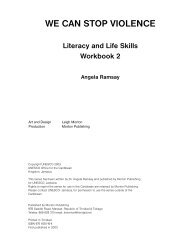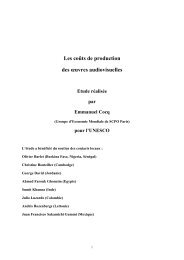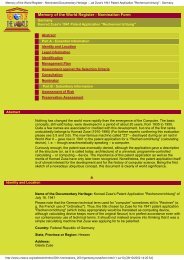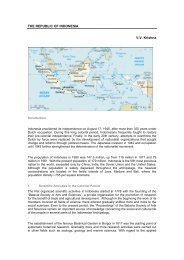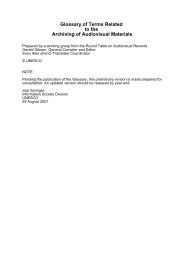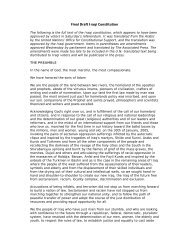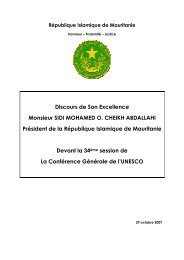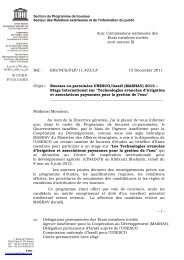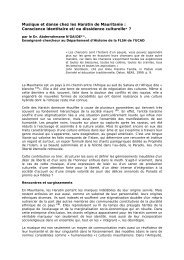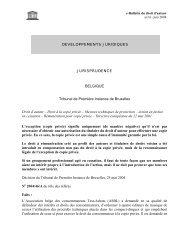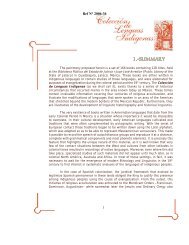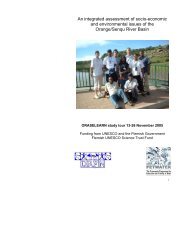Accepted Papers - 3.pdf - UNESCO
Accepted Papers - 3.pdf - UNESCO
Accepted Papers - 3.pdf - UNESCO
You also want an ePaper? Increase the reach of your titles
YUMPU automatically turns print PDFs into web optimized ePapers that Google loves.
we get our act together and make water ever body’s<br />
business. This means redefining the role of the state,<br />
of households and of communities in the provision<br />
of water and the protection of water resources.<br />
Therefore nationwide awareness campaigns that aim<br />
at the entire spectrum of involved parties from the<br />
central and state governments to the rural and urban<br />
communities, is a must.<br />
How then does one conduct effective<br />
awareness campaigns?<br />
In our consideration of the various strategies and<br />
methods we will move from the macro to the micro<br />
levels.<br />
1) Government Participation and support : It<br />
is essential to keep the Government aware of the<br />
activities related to rainwater harvesting so that their<br />
support and assistance, if required , can be solicited<br />
. Government officials like District Collectors, Chief<br />
Ministers and even the President and The Prime<br />
Minister must be invited to seminars and workshops<br />
that aim at changing the political mind-set from a<br />
top-down bureaucratic form of governance to a<br />
participatory form of governance where rural and<br />
urban communities are empowered to manage their<br />
own water resources. The government can push for<br />
community based water management policies and<br />
develop legislation.<br />
2) Government Awards : The Government in<br />
different states could set up awards to encourage<br />
the implementation of rainwater harvesting<br />
schemes. The Delhi Government, for instance, has<br />
already announced two lakh rupees for institutions<br />
and housing societies and one lakh rupees for<br />
individuals who have set up effective rainwater<br />
harvesting systems. (No wonder rainwater<br />
harvesting has taken off in such a big way in<br />
educational institutions and housing societies in<br />
Delhi).<br />
3) Model rainwater harvesting projects :<br />
Efforts must be made with government assistance<br />
to establish rainwater harvesting projects which can<br />
serve as models worthy of emulation. Trips must be<br />
arranged for neighboring communities to these<br />
project sites. This can be a very effective and<br />
convincing way of educating people.<br />
427<br />
4) Rainwater Centers : Every region must set<br />
up rainwater harvesting centers to provide<br />
information to interested individuals and<br />
communities interested in setting up rainwater<br />
harvesting systems. The rainwater harvesting center<br />
at Chennai, in collaboration with Akash Ganga<br />
Trust, sets up exhibitions that seek to spread water<br />
literacy among urban Indians.<br />
5) Networking with other N.G.O.s: Several<br />
N.G.O.s have done a lot of work on rainwater<br />
harvesting. Pooling the efforts and information<br />
resources of these organizations would go a long<br />
way in making rainwater harvesting a nationwide<br />
movement. For example CSE has made some good<br />
film advertisements like, “The Rain catchers” and<br />
“Jal Yodha”, which have been made available to<br />
interested parties. CSE and Manav Adhikar Seva<br />
Samiti (MASS) organized a traveling film festival<br />
from 30 th Nov. – 1 st Dec. in 2005. On our own level,<br />
ASA plans on collaborating with Enviro Vigil to<br />
set up an exhibition on our campus.<br />
6) Print and Television Media: The Media is a<br />
powerful tool for public awareness.<br />
a) Establish web-based discussion groups with<br />
a FAQ section (Frequently Asked Questions) and a<br />
forum for network partners to share their<br />
experiences on local water harvesting practices.<br />
There is already an Orkut RWH group for online<br />
committees.<br />
b) Newsletters can also be an effective platform<br />
for dissemination of information. CSE newsletters<br />
(Jalvibadri in Hindi and Catchwater in English )<br />
are mouthpieces of the National Water Harvesting<br />
Network.<br />
c) Educational Institutions at the school and<br />
college levels can organize awareness campaigns<br />
in the form of poster competitions, elocution<br />
competitions and processions where pamphlets of<br />
RWH are distributed.<br />
d) Street Plays organized by N.G.O.s and<br />
educational institutions can also serve as a powerful<br />
medium.<br />
7) Individual Effort On the individual level we<br />
who are committed to this cause of rainwater<br />
harvesting, can encourage can encourage those<br />
within our sphere of influence to implement such



